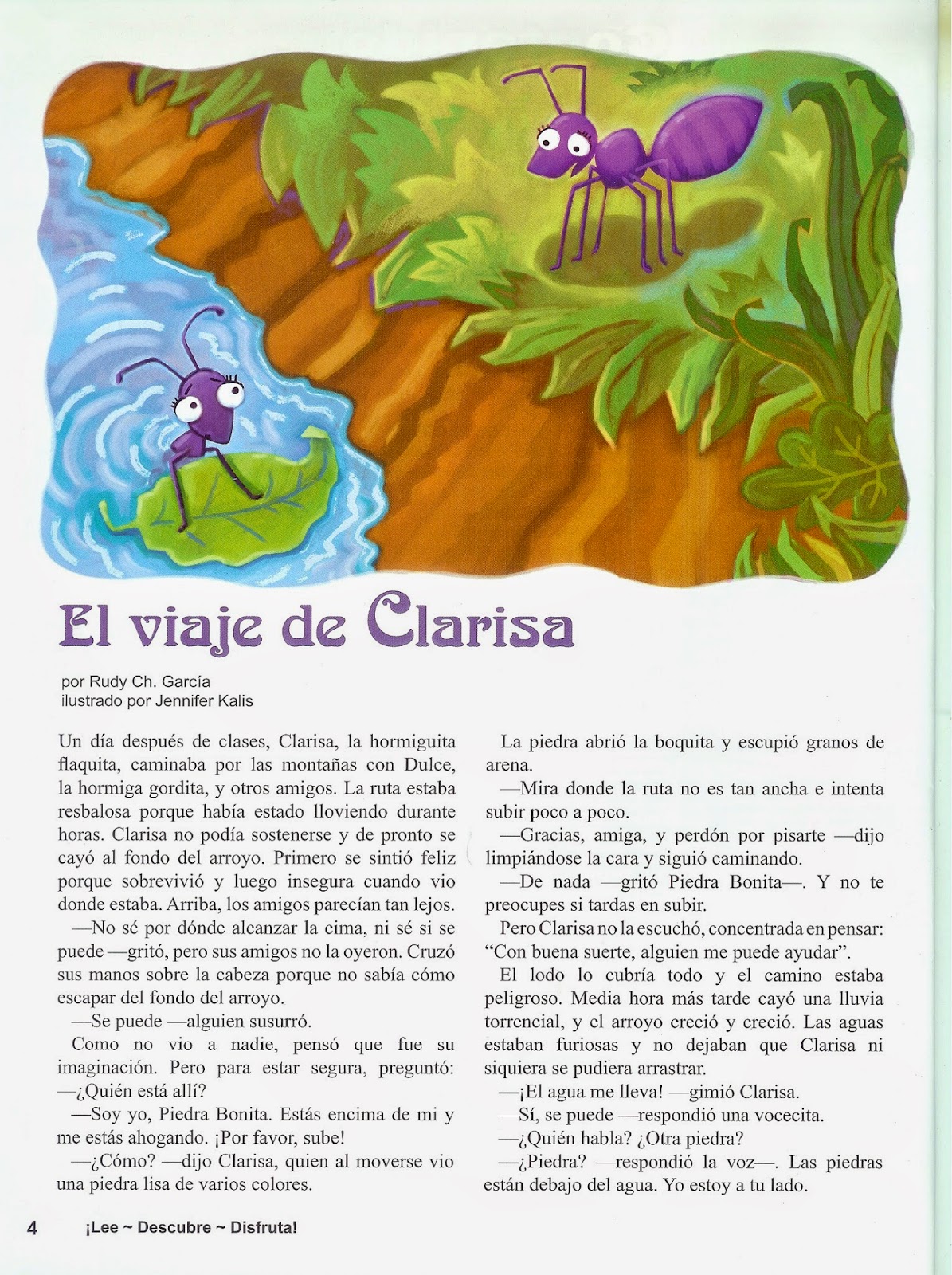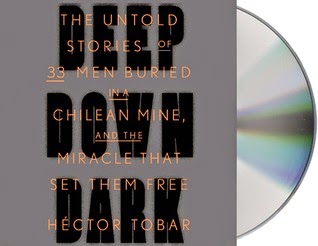 Two years ago, my first children's story in Spanish appeared in the national magazine, Iguana. El Viaje de Clarisa la Flaquita is a fable written in Spanish. It follows the journey of a brown, skinny, young girl ant who learns to struggle against and overcome problems that life never seems to stop throwing in her path and was inspired by the burdens carried by first-grade, immigrant children I use to teach. I'm still proud of that story and was glad it would be available for some time, which is why I was not happy to receive the following (bold type - my emphasis):
Two years ago, my first children's story in Spanish appeared in the national magazine, Iguana. El Viaje de Clarisa la Flaquita is a fable written in Spanish. It follows the journey of a brown, skinny, young girl ant who learns to struggle against and overcome problems that life never seems to stop throwing in her path and was inspired by the burdens carried by first-grade, immigrant children I use to teach. I'm still proud of that story and was glad it would be available for some time, which is why I was not happy to receive the following (bold type - my emphasis):"Dear Iguana family and friends,
I am heart-broken to inform you that the last issue of Iguanawill be Nov/Dec 2014. Cricket Media (Carus Publishing) has decided to stop production of all Spanish language magazines. The company is shifting its focus towards China. As a result, Marc and I are no longer employed by Cricket Media. It is unfortunate that Cricket Media did not fully commit to growing the brands despite the evidence that subscriptions were increasing.
We are in the process of getting Iguana back. However, it is currently financially infeasible for us to continue publishing Iguana. Marc and I want to thank all of you for your continued support and loyalty over these past ten years. It is thanks to you that Iguana was able to enrich the lives of many children. We hope that our paths may cross in the future and we can work together again.
Thank you, thank you so much from the bottom of our hearts.
Christianne Meneses Jacobs, Founder/Editor, Marc Jacobs, Art Director
Con el corazón destrozado les anuncio que la última edición de Iguana será la de noviembre/diciembre 2014. Cricket Media (Carus Publishing) ha decidido dejar de publicar todas las revistas en español y enfocarse en el mercado en China. Como resultado, Marc y yo ya no estamos trabajando para Carus. Desafortunadamente, los ejecutivos de Cricket Media no estaban completamente comprometidos en desarrollar las revistas a pesar de la evidencia de que las suscripciones estaban aumentado.
Estamos en el proceso de que nos regresen Iguana. Sin embargo, en estos momentos se nos dificulta economicamente continuar publicando Iguana. Marc y yo les queremos dar las gracias a todos por su continuo apoyo y lealtad en estos últimos diez años. Es gracias a todos ustedes que Iguana pudo enriquecer la vida de muchos niños. Esperamos que nuestros caminos se vuelvan a cruzar en el futuro y podamos trabajar juntos otra vez.
Gracias, muchísimas gracias desde el fondo de nuestros corazones.
Christianne Meneses Jacobs, Fundadora/Editora y Marc Jacobs, Director de Arte"
Whatever the merits of my fable, kids in my classrooms loved this magazine. I bought copies for school libraries and always had back issues in my room. Now, the magazine is threatened and might never publish again. As Virginia Alanis notes below: "Each month, approximately 50,000 US Latinos turn eighteen years of age." So, it's difficult to understand how Iguana's publishers are ceasing its publication. That they are "shifting focus toward China" might make sense; there are more Chinese kids than U.S. latinos. But here is the original press release when first taking over Iguana.
"Cricket Magazine Group’s Iguana to bring Spanish language, learning and culture to 7-12 year-olds
"In an interest to [sic] better serve the 50 million Latinos in the U.S., Cricket Magazine Group/Carus Publishing, a division of ePals, proudly announces the addition of Iguana magazine, its first Spanish-language magazine for children, ages 7‐12. Iguanawill expose children to the beauty of the Spanish language and the richness of Latin American culture and heritage. The magazine received a 2009 Children's Publication Award from the National Association of Multicultural Education.
"Iguana is a Spanish language magazine for children who grew up learning and speaking Spanish. Each issue engages children with interesting text, beautiful illustrations, and intriguing photographs across a wide variety of new and interesting topics including history, geography, science, technology, language arts, math and more. Iguana's interesting content motivates children to read, reinforcing reading skills in Spanish and encouraging Latino cultural preservation."
 It appears Carus is dropping their "proud" commitment to "better serve the 50 million Latinos in the U.S." But you can see for yourself what a great full-color, illustrated magazine Iguanawas, at this interactive sampler. It will be missed by more than me.
It appears Carus is dropping their "proud" commitment to "better serve the 50 million Latinos in the U.S." But you can see for yourself what a great full-color, illustrated magazine Iguanawas, at this interactive sampler. It will be missed by more than me.To get Carus Publishing's explanation for shutting down Iguana, I contacted them this week, and their computer answered: "We received your correspondence and will respond within two business days." That would be this coming Tuesday, and if I receive anything I'll append it to this post. You can contact Christianne M. Jacobs for further information about Iguana's future ([email protected]) or Karen Dudra (kdudra [@] caruspub.com) about Carus Publishing's decision. I assume publishing rights to my Clarisa story will revert to me, so I'll be seeking to get it published as a picture book.
"I wrote Love Field so readers could inhabit the 1980s and 1990s and smile at the things I took so seriously as a young woman. Even though I created outrageous characters and situations in my novel, I remained true to the basic thematic elements of a coming-of-age novel. I think of Love Field as Jane Eyre for Latinos, literary fiction about a girl in high school who runs away from home rather than return to Mexico with her family. She has the added baggage of making an early marriage, a jealous husband, and murderous in-laws—all while attending college."
Alanis's debut novel, Love Field, will be published in 2015, but in the meantime you can read her summary.
Deep Down Dark
Check out noted director/author Jesus Treviño's Latinopia documentary video on Hector Tobar's novel.
 "On August 5, 2010, thirty-three miners were trapped underground following a mine cave-in at the Chilean town of Copiapó. Pulitzer Prize-winning journalist and novelist Hector Tobar obtained exclusive access to the miners and tells their story in his novel Deep Down Dark. Latinopia asked Tobar how the novel came about.
"On August 5, 2010, thirty-three miners were trapped underground following a mine cave-in at the Chilean town of Copiapó. Pulitzer Prize-winning journalist and novelist Hector Tobar obtained exclusive access to the miners and tells their story in his novel Deep Down Dark. Latinopia asked Tobar how the novel came about.Es todo, hoy,
RudyG, a.k.a. Rudy Ch. Garcia, author of El Viaje de Clarisa la Flaquita, in print for a limited time
0 Comments on Kids' Spanish mag to close. Virginia Alanis novel. Deep Down Dark. as of 10/11/2014 12:13:00 PM
Add a Comment





